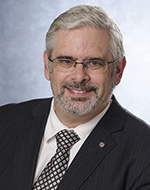Page Content
 Question: In a recent Q&A, you were highly critical of a United Conservative Party (UCP) policy to divide the ATA into two separate organizations: a union and a professional association. How can you criticize the UCP when the ATA is supposed to be non-partisan?
Question: In a recent Q&A, you were highly critical of a United Conservative Party (UCP) policy to divide the ATA into two separate organizations: a union and a professional association. How can you criticize the UCP when the ATA is supposed to be non-partisan?
Answer: Well, this may be the first time we’ve run a Q&A on a Q&A, but the question is an important one and highlights some important issues around the role of the Alberta Teachers’ Association in the political life of the province.
To start with, the Association is, by policy, non-partisan. Long-range policy 14.A.3, which has been in place in its current form since 1977, states that “the Alberta Teachers’ Association avoids alignment with any political party or candidate for political office.” The practical effect of this is fleshed out in other long-range policies. For example, policy 14.A.4 states that “the Alberta Teachers’ Association maintains contact with all major political parties,” while 14.A.16 stipulates that “the Alberta Teachers’ Association and its subgroups are prohibited from making financial contributions to parties or candidates for political office.”
The ATA’s approach is not necessarily consistent with the practices of other teachers’ organizations in Canada. In British Columbia and Ontario, for example, some teachers’ organizations have chosen to formally align themselves with, or actively and explicitly support, individual political parties.
Throughout the history of the Association, its leaders have been of the mind that such an approach does not yield the best results for teachers. When the party supported by the teachers’ organization is in power, it is all too easy for politicians to take for granted the teachers’ contribution to their success. When a hostile government is in place, it has scant motivation to accommodate teachers’ interests or concerns as long as teachers are perceived to be aligned with the opposition.
But being non-partisan does not mean that the Association is not active politically. The Teaching Profession Act lists among the legislated objects of the Association “to advance and promote the cause of education in Alberta” and “to arouse and increase public interest in the importance of education and public knowledge of the aims of education, financial support for education, and other education matters” (sections 4(a) and (c)).
The implications of this mandate for the political activity of the Association are set out in policy as well: policy 14.A.1 states that the Association “works within the political system to influence decisions affecting education” while 14.A.2 says the Association “undertakes both formal and informal political engagement.”
For the most part, the Association’s political activities are educative: we try to highlight to the public, to elected leaders and to civil servants teachers’ concerns and then advocate for legislation, policy and funding consistent with the extensive body of policy that has been approved by the Annual Representative Assembly. To this end, policy 14.A.11 states that the Association encourages political parties and candidates to articulate their education policies and plans for financing them.
The Association recognizes that, as far as personal beliefs are concerned, its membership spans the political spectrum, and it encourages individual teachers to be politically active. In policy 14.A.15, the Association “encourages the active participation of individual teachers, as citizens, in the political process, including through partisan activity.”
Ultimately, the power of the profession is maximized when the largest number of individual teachers are actively engaged in the political life of the province by participating, supporting and funding the political parties that best represent their beliefs.
Walking the non-partisan line can be tricky at times, and one concern I have is that the Association’s ability to have meaningful dialogue with all political parties depends largely on the willingness of every party to have meaningful dialogue with the Association. President Greg Jeffery’s letter to Jason Kenney following the UCP convention was an effort to initiate a conversation with the UCP leader — unfortunately we have not yet heard back from him, but we continue to be open to a dialogue.
Finally, we are non-partisan because the work of political engagement is never easy or finished, no matter which party is in power. I am reminded of the old joke that the problem with democracy is that, no matter who you vote for, the government still gets in. ❚
Questions for consideration in this column are welcome. Please address them to Dennis Theobald at dennis.theobald@ata.ab.ca.
